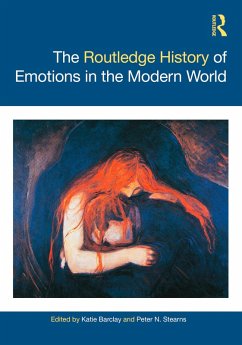
A History of American Thought 1860-2000 (eBook, PDF)
Thinking the Modern
Versandkostenfrei!
Sofort per Download lieferbar
38,95 €
inkl. MwSt.
Weitere Ausgaben:

PAYBACK Punkte
19 °P sammeln!
This book is a comprehensive overview of the history of modern American thought and examines a wide range of modern thought and thinkers from 1860, when Charles Darwin's Origin of Species was published in the United States, to the end of the twentieth century.The focus of this volume is on the destabilizing effects of modern challenges to notions of fixed order and absolute truths, and the contradictory consequences for philosophical, political, social, and aesthetic thought. The intellectual response to the unprecedented changes of this era produced visions of both liberation from the hierarc...
This book is a comprehensive overview of the history of modern American thought and examines a wide range of modern thought and thinkers from 1860, when Charles Darwin's Origin of Species was published in the United States, to the end of the twentieth century.
The focus of this volume is on the destabilizing effects of modern challenges to notions of fixed order and absolute truths, and the contradictory consequences for philosophical, political, social, and aesthetic thought. The intellectual response to the unprecedented changes of this era produced visions of both liberation from the hierarchies of the past and new forms of control and constraint. One of the central contradictions in modern thought was between biological and cultural ideas of social, psychological, and moral order. This is the first work to provide an interpretive vision of the entire period under consideration. Topics covered include evolutionary thought, philosophical Pragmatism, ideas of race and gender, pluralism and cultural relativism, Cold War Liberalism, science and religion, feminist thought, evolutionary psychology, and the late twentieth-century Culture Wars. Thinkers from William James and Charlotte Perkins Gilman through Judith Butler and Cornel West are analyzed as historical figures.
This volume is an ideal resource for a general audience as well as undergraduate and graduate students in the field of American intellectual history.
The focus of this volume is on the destabilizing effects of modern challenges to notions of fixed order and absolute truths, and the contradictory consequences for philosophical, political, social, and aesthetic thought. The intellectual response to the unprecedented changes of this era produced visions of both liberation from the hierarchies of the past and new forms of control and constraint. One of the central contradictions in modern thought was between biological and cultural ideas of social, psychological, and moral order. This is the first work to provide an interpretive vision of the entire period under consideration. Topics covered include evolutionary thought, philosophical Pragmatism, ideas of race and gender, pluralism and cultural relativism, Cold War Liberalism, science and religion, feminist thought, evolutionary psychology, and the late twentieth-century Culture Wars. Thinkers from William James and Charlotte Perkins Gilman through Judith Butler and Cornel West are analyzed as historical figures.
This volume is an ideal resource for a general audience as well as undergraduate and graduate students in the field of American intellectual history.
Dieser Download kann aus rechtlichen Gründen nur mit Rechnungsadresse in A, B, BG, CY, CZ, D, DK, EW, E, FIN, F, GR, HR, H, IRL, I, LT, L, LR, M, NL, PL, P, R, S, SLO, SK ausgeliefert werden.













